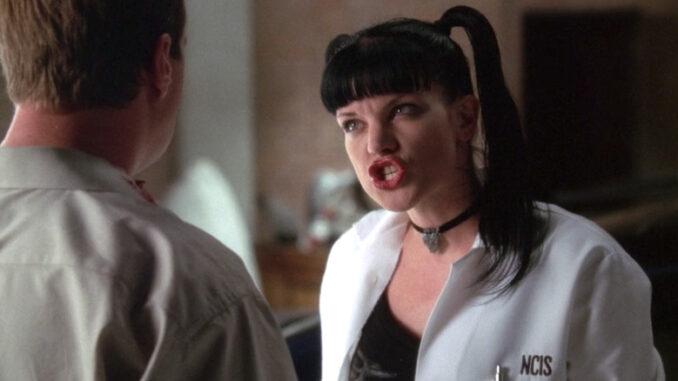
The Hand That Held Too Much: How an Abby Scene on NCIS Crossed a Line
For two decades, NCIS has been a cornerstone of procedural television, drawing millions with its blend of intricate mysteries, patriotic heroism, and, most importantly, a found-family dynamic among its core characters. At the heart of this family, often literally in the heart of the Navy Yard, was Abby Sciuto: the quirky, brilliant, Caf-Pow-guzzling forensic scientist. Abby was a beloved character, a goth savant with a childlike innocence and an almost sacred bond with Gibbs. She was the team's moral compass, their emotional anchor, and, crucially, their protected little sister. Which is precisely why a particular scene in the Season 10 finale, "Extreme Prejudice," featuring Abby and the season's primary antagonist, Harper Dearing, didn't just push boundaries – it shattered them, leaving many viewers with a lingering sense of discomfort that betrayed the very spirit of the show.
Abby Sciuto's character was meticulously crafted to be extraordinary yet vulnerable. Her lab was her sanctuary, a chaotic explosion of scientific genius and gothic whimsy where she was inviolable. The team, especially Gibbs, fiercely protected her, treating her less like a colleague and more like a cherished, irreplaceable daughter. This established dynamic meant that while Abby might face danger, she was always, implicitly, safe. She was the one who solved the puzzle, not the one who became the puzzle's victim in a way that felt deeply personal and violating. Her quirks were endearing; her occasional fears, relatable. But the show never delved into true, prolonged psychological terror for her, preferring to keep her within a realm where her unique talents could shine without being overshadowed by a need for rescue.
The scene in question unfolds in the climax of the hunt for Harper Dearing, a sophisticated, vengeful bomb-maker who has terrorized the NCIS team and the Navy Yard throughout the season. Dearing, cornered and injured, demands Abby's help to stop a countdown he's initiated. The tension is palpable as Abby, under duress, works to disable the device, her usual bubbly demeanor replaced by wide-eyed terror. But then, as she races against the clock, Dearing, with a chillingly casual gesture, takes her hand. Not a grab, not a threat, but a prolonged, unsettling clasp – an act of forced intimacy and grotesque comfort from a monster.
This single moment pushed things too far for several critical reasons. Firstly, it was a profound violation of Abby's character. Her carefully guarded innocence, her status as the "protected" one, was utterly stripped away. It wasn't a moment of heroic struggle or brave defiance; it was an act of insidious, psychological power by a villain who had already caused immense suffering. For Dearing, it was a final, depraved taunt, an assertion of dominance over the one character most emblematic of the team's soul. For Abby, it was a moment of profound helplessness, forcing her into an unwanted, chilling connection with pure evil.
Secondly, the scene felt exploitative rather than truly impactful. While good television often challenges its characters and audience with difficult scenarios, this particular interaction seemed to trade on cheap shock value. It lacked the narrative payoff or the subsequent character development that might have justified such a visceral violation. Abby, while visibly shaken, seemed to bounce back with remarkable speed, as if the profound trauma of being forced into that horrific intimacy with her tormentor didn't leave a more significant, lasting scar. It felt like a decision made for a momentary gasp from the audience, rather than a genuine exploration of psychological fallout or a meaningful arc for a beloved character.
Finally, the scene felt like a betrayal of the audience's trust in the show's established ethos. NCIS built its foundation on the unwavering loyalty and protective instincts of its team. To see Abby, the very embodiment of the show's quirky heart, subjected to such a deeply unsettling and unearned violation, felt wrong. It blurred the lines between the show's usual brand of suspense and a more insidious form of terror that did not suit its tone or its characters. The hand-holding scene wasn't about heroism or justice; it was about the sickening feeling of watching a vulnerable, innocent character endure something truly repugnant, simply because the villain could.
The Abby-Dearing hand-holding scene stands out in NCIS history not just for its intensity, but for its misjudgment. It chipped away at the carefully constructed protective shell around Abby's character, creating a moment of visceral discomfort that felt gratuitous and ultimately underserved by the narrative. While a show must evolve and challenge its characters, this scene crossed a line, pushing beyond dramatic tension into an uncomfortable realm of violation that, for many, remains a sour note in the otherwise beloved symphony of NCIS. It was a reminder that even the most cherished fictional families have moments where the storytelling choices feel less like evolution and more like an unwelcome invasion.